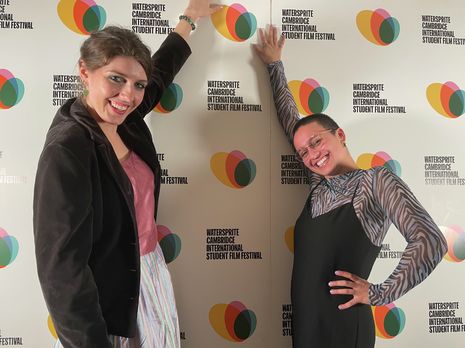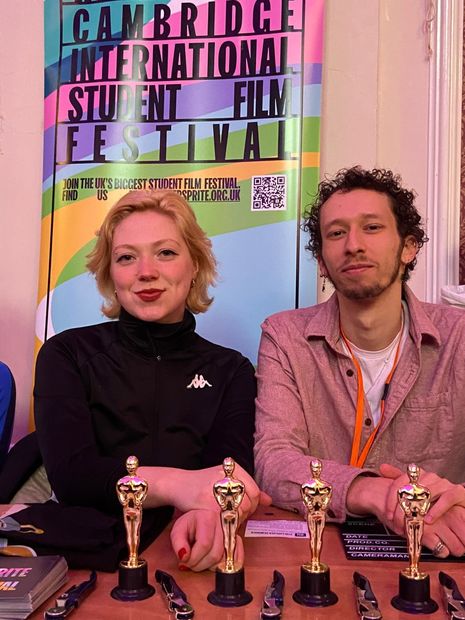Watersprite Film Festival: An Unmissable Student-Led Effort
Inês Goes-Marlière sits down with this year’s Watersprite festival director and head of operations to discuss what makes the festival so special

“I didn’t actually know anything about Watersprite in my first and second year”, Charlotte Matheson, the festival’s director confesses, when I sit down with her and head of operations Zeb Goriely in Harvey’s Coffee House. “Even though for a long time it’s been the biggest international screen festival in the UK, and I’m interested in film. Even now, I speak to my friends, and they don’t know it happens in Cambridge every year”.
This year, the Watersprite film festival will run between the 3rd and 5th of March. It includes everything from the screening of 27 nominated student films from around the world, to screenwriting workshops, industry talks and more. All events are organised by committees of student volunteers from Anglia Ruskin and Cambridge, and aim to give people aged 16-30 an opportunity to engage collaboratively with film, both in person and online.
“With student films there’s no oversight, no guidelines; people just make what they want”
This hybrid format, maintained by the festival post-pandemic, has significantly boosted its global profile; “although it makes it more difficult to run, because all of our events need to be live-streamed, it hugely increases the reach of the festival”. Zeb informs me that it’s probably here to stay, because the festival’s “main charitable goal is in part to widen access on how to break into the film industry. Before the hybridisation, we were mainly reaching people local to Cambridge, whereas now people can watch it all over the world”.
Expansion has seen the festival receive a record-breaking number of entries, from 106 countries, including a 40% increase from the African continent, after the outreach programme the festival led over the summer. The programme, Charlotte explains, consisted of “every head of department consulting the submissions map from the year before, and seeing which areas we weren’t getting submissions from. Then, we would research 10 film institutions from those areas, and find the email addresses of people that worked there so we could email them all individually. It worked; being attentive and personal with people goes a long way”.
At a local level, this outreach effort saw attention paid to strengthening the links between Cambridge and Anglia Ruskin, since Watersprite is an organisation uniquely formed of the two. Zeb tells me that “most ARU students have never set foot in a Cambridge University building, and vice-versa. I was talking to someone from Footlights, and they were complaining about how they can never get anyone to film their shows when there’s a whole university next door with a whole film department. Get in touch with them!”

Indeed, the collaborative nature of the festival is what makes it so special. Charlotte admits that “at points, I’ve asked myself, ‘why am I doing this? This is so huge and I’m in my final year. I should be focusing’”. A feeling familiar to us all. “I don’t want to say something like it’s run on passion. But I think I know that this festival is so pure — not only in its showcasing of student films untainted by the film industry — but also it’s not run on money, but on people caring about film and things like our awards team sending out personal letters to the nominees around the world”. There is a generous, independent spirit; “something inherently good about it that’s nice to channel your energy into”.
“It’s not run on money, but on people caring about film”
In Zeb’s words, “it’s raw creativity. With student films there’s no oversight, no guidelines; people just make what they want”; this is what makes student films especially exciting. Charlotte adds: “the fact that it’s run by students, that’s incredible. When you speak to people at other professional festivals (in paid positions) they’re always astounded at the number of films we get through and judge fairly. It’s like, ‘how could these students do that?’”.
The festival’s events and screenings are also completely free! Anyone in this area, from the keen thesps and film buffs interested in screen acting classes, to the rest of the general student population, has a huge opportunity to get some real insights into the film industry through talks, masterclasses, workshops, Q&As and the chance to watch great student films that have undergone a rigorous judging process.
The events will be held at the Old Divinity School in St John’s. Friday 3rd will be a day exclusively aimed at sixth formers, in partnership with BBC Three, so invite all the moody year 12 and 13 students you know! It will be strutted around three workshops: “How to Fund a Film”, “How to Make a Film” and “How to Distribute a Film”. Saturday 4th and Sunday 5th will be open to everyone. Get involved and take yourself to a screening, spot some celebrities, and try out some workshops — you never know, you just might become the next Sam Mendes.
In the words of Charlotte, “it’s all free, why wouldn’t you?”
 News / Downing Bar dodges college takeover31 January 2026
News / Downing Bar dodges college takeover31 January 2026 Comment / College rivalry should not become college snobbery30 January 2026
Comment / College rivalry should not become college snobbery30 January 2026 Fashion / A guide to Cambridge’s second-hand scene2 February 2026
Fashion / A guide to Cambridge’s second-hand scene2 February 2026 Lifestyle / Which Cambridge eatery are you?1 February 2026
Lifestyle / Which Cambridge eatery are you?1 February 2026 News / Cambridge for Palestine hosts sit-in at Sidgwick demanding divestment31 January 2026
News / Cambridge for Palestine hosts sit-in at Sidgwick demanding divestment31 January 2026









